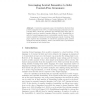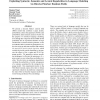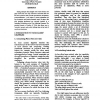10 search results - page 1 / 2 » Leveraging Lexical Semantics to Infer Context-Free Grammars |
ECML
2003
Springer
13 years 10 months ago
2003
Springer
Context-free grammars cannot be identified in the limit from positive examples (Gold, 1967), yet natural language grammars are more powerful than context-free grammars and humans ...
ICML
2005
IEEE
14 years 6 months ago
2005
IEEE
We present a directed Markov random field (MRF) model that combines n-gram models, probabilistic context free grammars (PCFGs) and probabilistic latent semantic analysis (PLSA) fo...
ACL
1990
13 years 6 months ago
1990
according to this definition2. Each elementary tree is constrained to have at least one terminal at its frontier which serves as 'head' (or 'anchor'). Sentence...
CORR
1998
Springer
13 years 5 months ago
1998
Springer
We here explore a "fully" lexicalized Tree-Adjoining Grammar for discourse that takes the basic elements of a (monologic) discourse to be not simply clauses, but larger ...
COLING
2010
13 years 8 days ago
2010
Lexicalized Well-Founded Grammar (LWFG) is a recently developed syntacticsemantic grammar formalism for deep language understanding, which balances expressiveness with provable le...



